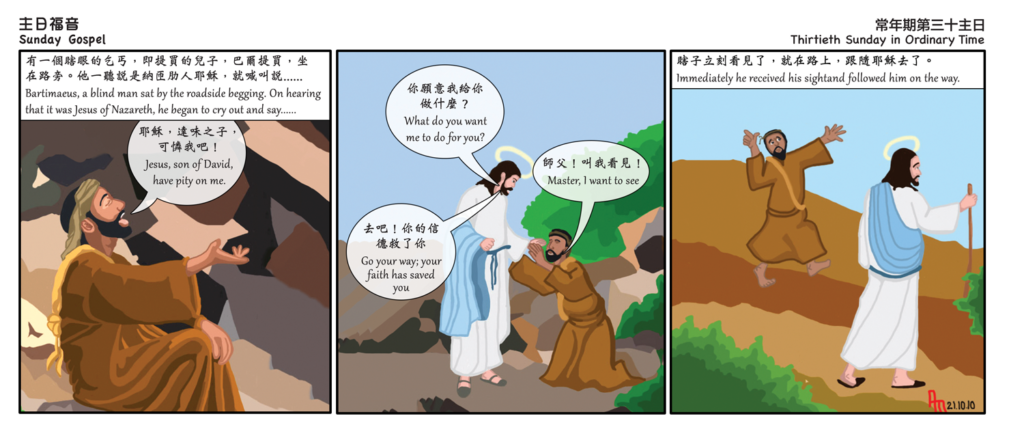Jer 31:7-9; Heb 5:1-6; Mk 10:46-52
May Tam
www.FLL.cc
Bartimaeus, though blind, was alert to Jesus’ coming. Despite his social disadvantage and his physical constraint, he did not give in to the crowd who attempted to silence him. He would not let them deprive him of this opportune chance to get help. He unrelentingly overcame all the hindrances in order to catch Jesus’ attention. He reacted not only enthusiastically but also confidently when being summoned to meet Jesus. With a strong faith in Him, he abandoned his cloak (his sole possession to catch handouts from passersby) for he was certain that both his physical and economic status would be changed. In other word, he anticipated a transformation. Bartimaeus asked the right thing, a request fully consistent with his problem (that he may see again). Compare with the request of James and John (Mk 10:36) who asked for power and honor, this simple quest for restored sight is justifiable, seeking no special privilege.
Dear friends: when, in our lives, does Jesus pass by? Are we alert to that? Have we missed all those given chances unknowingly or negligently? Do we strive to overcome any obstacle that impedes us to get to Jesus and ask Him for help? Do we have Bartimaeus’ perseverance? Do we sometimes, like the crowd, inhibit others to get to Jesus on the assumption of self righteousness or self rightfulness by putting our own needs to Jesus before them? What do we expect when we find Jesus? Are we bold enough to cast off our old selves when He calls us? Are we willing to be transformed and do we ask for the right things?
Bartimaeus won Jesus ‘praise for his faith and was rewarded with what he wanted. But the most commendable thing that Bartimaeus did, right after gaining his sight, was to follow Jesus “on the way”—– the way to Jerusalem, the way to our Lord’s passion and death. Do we give thanks in words only when our requests are granted or like Bartimaeus, put it into action as Jesus’ true followers, and accompany Him “on the way” for better and for worse?
Although Jesus, being surrounded by His disciples and a large crowd, was ready to leave yet He “stood still” when attending Bartimaeus’ cry. He will do the same for us when our cries are earnest and persistent, when our requests are humble and honest and most of all, when our faith in Him is strong and unwavering.
Journey of Faith
– Fr Fernando Armellini SCJ
Claretian Publications, Macau
Today’s Gospel pictures Jesus in Jericho, before the ascent to Jerusalem. He makes a last sign: healing a blind man, named Bartimeus. In Mark’s intention, Bartimaeus is the image of the disciple who finally opens his eyes to the light of the Master and decides to follow him along the way.
The first frame shows the beggar “sitting along the way”. He represents the man who is not yet enlightened by the Gospel and by the light of Easter. The first step he takes to recovery is the awareness of his situation, here spiritual blindness. Only those who realize that they are leading a meaningless, unacceptable life, decide to look for a way out. Bartimaeus gathers his wits to scream, asking for help from Jesus; he no longer wants to stay in his state of life.
The meeting with those who follow the Master is the first step towards the light (v. 47). Before reaching Christ one runs into the disciples and there are difficulties to overcome.
Even those who accompany Jesus can be an impediment to those who try to approach the light of the gospel. It seems impossible that the group of disciples, who followed the Master from Galilee, can still be spiritually blind and be a hindrance to those who want to meet Christ. Even at Jericho, many rebuked Bartimaeus to “keep quiet”, and this continues to happen today.
“Jesus hears the cry of Bartimaeus,” and demands that he be brought before him. His call does not directly reach the blind; there is someone responsible for passing it on. These mediators represent the true followers of Christ, who are sensitive to the cry of those who seek the light. They encourage an encounter with the Lord. “Take heart! Get up, he is calling you”.
And so we come to the last stage. The blind man “jumps up, throws off his mantle and runs” to the one who can give him sight. The actions of the blind man have a symbolic value and a theological message to communicate.
In Israel, the “mantle” was considered the only asset owned by the poor, “is all the covering he has for his body. In what else will he sleep?” (Ex 22:26). Like any beggar, Bartimaeus puts himself on his knees and uses them to gather alms. The act of abandoning it, along with a few coins that passersby kindly placed there, indicates the complete detachment from the state in which he lived. He is no longer interested in the life he led up to that moment.
The story ends with the dialogue between Jesus and the blind man. The Master asks everyone who seeks the light to make his profession of faith, to believe in the one who can open his eyes.


 Follow
Follow


